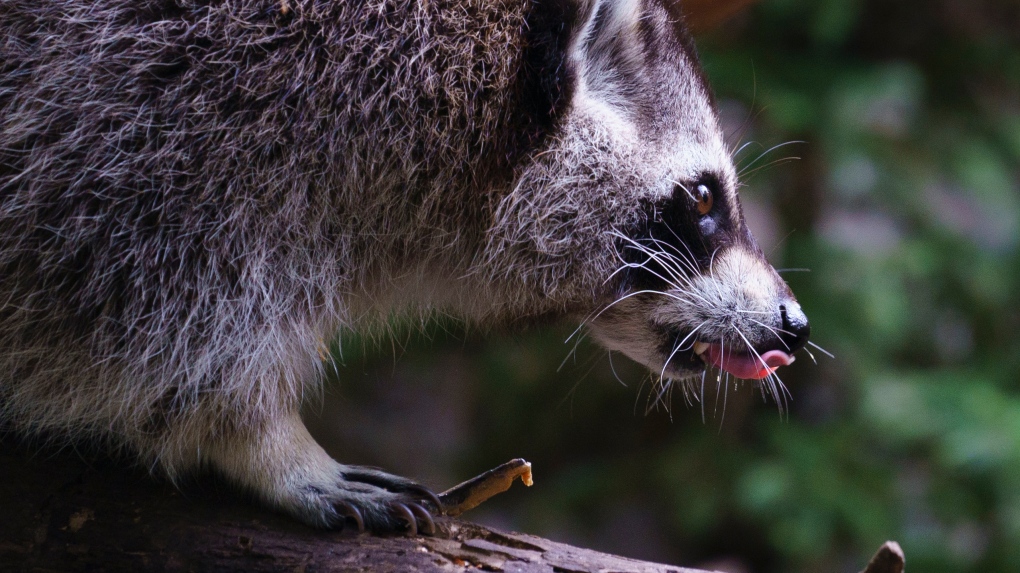A viral outbreak is making some Toronto raccoons more aggressive and less afraid of humans
Joseph Romain was sweeping leaves Sunday afternoon when he came face-to-face with a “very large” and aggressive raccoon.
“This angry raccoon came shooting out between the two garages and went for me,” he told CTV News Toronto Tuesday.
“I went in the house and closed the door. The raccoon stayed on the porch squawking and screaming, and hissing, and then he came down and up this tree.”
Fortunately, the east Toronto resident was able to get away from the critter but said the ordeal was “very distressing.”
Romain, in a Facebook post on a Leslieville group, said he called “animal control” to report the sick raccoon, which he said poses a danger to children and pets, but said as of Tuesday afternoon, he is still waiting for someone to show up.
The raccoon that came for Romain likely has distemper, a contagious and serious disease caused by a virus that attacks the respiratory, gastrointestinal and nervous systems of dogs and other wildlife, including foxes, raccoons, coyotes, and skunks.
While distemper has been around for some time, Toronto Animal Services (TAS) says that they typically see an increase in the illness among the raccoon population every two to three years.
They said a raccoon distemper outbreak is declared when they start to see an increase in service requests for sick raccoons exhibiting symptoms associated with distemper.
The latest monthly data from TAS shows there was a significant increase for service requests for raccoons from May to September 2022 in both cadaver pick-up and injured and sick wildlife, prompting them to declare a raccoon distemper outbreak.
Supervisor Carl Bandow said for context, between October 31 and November 6, they received 502 requests for sick/injured animals, 70 requests for confined stray animals, stray dogs at large and animals in need of protective care as a result of the owner being hospitalized, incarcerated, fire emergency or evicted, and 411 service requests for cadaver pick up.
With so many calls for service, Toronto Animal Services said wait times for sick, injured or deceased wildlife have significantly increased.
“There are typically four TAS officers working during the day and two at night to respond to service requests. While staff work to remove cadavers as soon as possible, we do prioritize responding to calls of sick and injured animals,” Bandow told CP24.
“At present, TAS is averaging a 12- to 14-day response time for cadaver pick-up service requests versus the standard 48 hours. Our small and dedicated team works very hard to prioritize requests and respond in a timely manner. We thank residents for their patience and understanding during this very busy time.”
Toronto Animal Services told CP24 that most of the recent service requests are from Ward 14 (Toronto-Danforth) and Ward 19 (Beaches East York), “with a lesser increase” in Ward 15 (Don Valley West) and Ward 20 (Scarborough Southwest).
Toronto Animal Services said raccoons with distemper typically lose their fear of humans, appear blind and confused, may wander aimlessly, and may become aggressive, if cornered. The division is advising residents to “avoid physical contact with raccoons and other wild animals and to give them the space they need to run away.”
They’re also advising people to take extra precautions to reduce the risk of disease transmission from wildlife to dogs, including ensuring dogs are vaccinated against distemper and rabies, closely monitoring their dogs when outdoors so they don't encounter wildlife, and discouraging raccoons from taking up residence in yards.
More information about raccoon distemper can be found on the City of Toronto’s Raccoons web page.
With files from CTV News Toronto’s Beth MacDonnell.
Must Watch
Top Videos
CTVNews.ca Top Stories

Trudeau appears unwilling to expand proposed rebate, despite pressure to include seniors
Prime Minister Justin Trudeau does not appear willing to budge on his plan to send a $250 rebate to 'hardworking Canadians,' despite pressure from the opposition to give the money to seniors and people who are not able to work.
'Mayday!': New details emerge after Boeing plane makes emergency landing at Mirabel airport
New details suggest that there were communication issues between the pilots of a charter flight and the control tower at Montreal's Mirabel airport when a Boeing 737 made an emergency landing on Wednesday.
Cucumbers sold in Ontario, other provinces recalled over possible salmonella contamination
A U.S. company is recalling cucumbers sold in Ontario and other Canadian provinces due to possible salmonella contamination.
Trudeau says no question incoming U.S. president Trump is serious on tariff threat
Prime Minister Justin Trudeau says incoming U.S. president Donald Trump's threats on tariffs should be taken seriously.
Democratic lawmakers from Connecticut report Thanksgiving bomb threats against their homes
At least six Democratic members of Congress from Connecticut were targeted by bomb threats on their homes Thursday, the lawmakers or their offices said.
Latest updates: Tracking RSV, influenza, COVID-19 in Canada
As the country heads into the worst time of year for respiratory infections, the Canadian respiratory virus surveillance report tracks how prevalent certain viruses are each week and how the trends are changing week to week.
Machete used to kill Edmonton man may have been picked up by passerby: police
Police are searching for the weapon used to kill an Edmonton man last month.
Weekend weather: Parts of Canada could see up to 50 centimetres of snow, wind chills of -40
Winter is less than a month away, but parts of Canada are already projected to see winter-like weather.
Newfoundland's LGBTQ2S+ bar paid drag queens $37.50. Tara Nova called them out.
If the screaming crowd in the twinkling Majestic Theatre in downtown St. John's was any indication, Newfoundland drag queen Tara Nova will never have to accept $37.50 for a show again.
























































